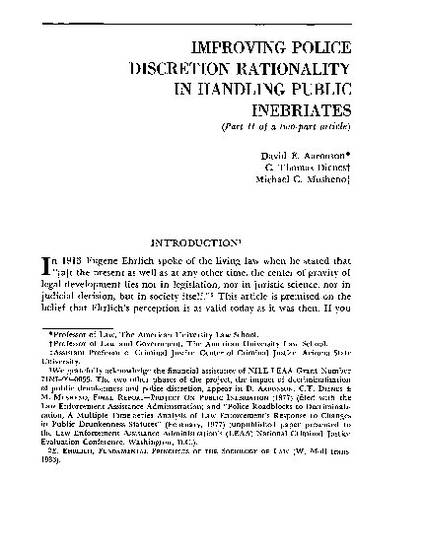
Article
Improving Police Discretion: Rationality in Handling Public Inebriates Part II
Adminisrative Law Review
(1978)
Abstract
In 1913 Eugene Ehrlich spoke of the living law when he stated that "[a]t the present as well as at any other time, the center of gravity of legal development lies not in legislation, nor in juristic science, nor in judicial decision, but in society itself.' This article is premised on the belief that Ehrlich's perception is as valid today as it was then. If you want to know the law relating to public intoxication you cannot be content with the statutes and ordinances, in the court decisions nor even the administrative rules and regulations of those charged with enforcing the laws. It is necessary to deal with the happenings in society generally. In this instance it is necessary to confront the day to
day decision-making of the primary actor in enforcement of the legal policy relating to drunkenness. It is the manner in which the patrol officer exercises his street discretion that truly defines the operative legal policy, and, it is in the manipulation of that judgment through the use of incentives and disincentives that the desired policy goals can be best pursued.
Keywords
- police,
- policing,
- discretion,
- crime,
- criminal law,
- criminal procedure
Disciplines
Publication Date
1978
Citation Information
David Aaronson , C. Thomas Dienes and Michael C. Musheno. "Improving Police Discretion: Rationality in Handling Public Inebriates Part II" Adminisrative Law Review Vol. 30 Iss. 1 (1978) p. 93 - 132 Available at: http://works.bepress.com/david_aaronson/26/
